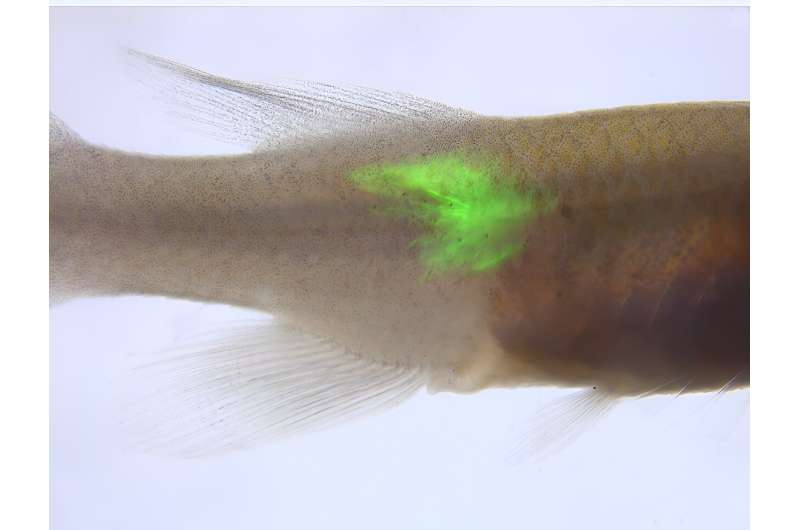This article has been reviewed according to Science X's editorial process and policies. Editors have highlighted the following attributes while ensuring the content's credibility:
fact-checked
peer-reviewed publication
trusted source
proofread
A new versatile tool for studying fish hormones may transform fish farming

Dr. Itamar Harel, along with Ph.D. student Eitan Moses and postdoctoral researcher Dr. Roman Franek, all from the Hebrew University of Jerusalem, has introduced an innovative platform for controlling peptide hormones in fish, providing a fast and effective way to study fish biology extensively. Its potential uses go beyond research, including the ability to transform fish farming techniques, administration of hormones in the clinic, and explore ways to prolong vertebrate lifespan.
Peptide hormones from the pituitary gland play a vital role in regulating key life events in vertebrates, such as growth, reproduction, metabolism, and aging. Precisely controlling hormone levels over various timeframes is crucial for properly managing these traits. However, conducting experiments to regulate hormones within living organisms has historically been a challenging endeavor.
In a significant breakthrough, the team introduced a novel approach using the small turquoise killifish as a model organism. Their research unveils a versatile platform capable of conducting two types of manipulations: loss-of-function and gain-of-function studies, specifically targeting peptide hormones in fish.
By manipulating three primary pituitary hormones—growth hormone (GH), follicle-stimulating hormone (FSH), and thyroid-stimulating hormone (TSH)—the researchers observed that hormone-deficient fish displayed significant changes in somatic growth and reproduction. These results indicate that, despite the killifish's exceptionally rapid growth and maturity, it relies on genetic networks shared across vertebrate species.
In the next phase of their research, the scientists devised a system to precisely control hormone expression. This system attaches a specialized fluorescent marker to the hormones and then introduces these marked hormones into the fish's body using a technique called intramuscular electroporation.
Remarkably, a single electroporation treatment enabled hormone-deficient fish to maintain essential traits, including reproductive capabilities, for extended periods. The researchers demonstrated the adaptability of their method by combining multiple hormonal interventions, precisely controlling their levels, and regulating hormone activation as needed.
In summary, this innovative method offers a rapid and efficient means of studying fish biology on a large scale. Its potential applications extend beyond research, encompassing possibilities for revolutionizing fish farming practices, clinical hormone administration, and investigating methods to extend the lifespan of vertebrates.
Prof. Itamar Harel, said, "Our platform opens up new horizons for comprehending the role of peptide hormones in vertebrate biology and provides a powerful tool for researchers in this field. It also holds promise for applications in aquaculture and the exploration of interventions to enhance longevity."
The research is published in the journal eLife.
More information: Eitan Moses et al, A scalable and tunable platform for functional interrogation of peptide hormones in fish, eLife (2023). DOI: 10.7554/eLife.85960
Journal information: eLife
Provided by Hebrew University of Jerusalem




















